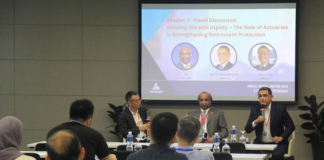JOHOR BAHRU, April 19 – Johor is hoping for “positive news” from Prime Minister Tan Sri Muhyiddin Yassin’s meeting with his Singaporean counterpart Lee Hsien Loong scheduled for early next month, which is expected to discuss the reopening of the border between both countries.
Johor Menteri Besar Datuk Hasni Mohammad said this was because the reopening of the border was an ongoing agenda of the state government and that it would ensure that those involved in crossing the border from Johor, like workers, received the COVID-19 vaccine.
“Therefore, we will also present to the federal government standard operating procedures (SOPs) for crossing the border. This will include limited movement, although they can cross the border, it does not mean that they can travel all over Singapore.
“If if it is for work, it means that they have to move from point A and point B. So there will be a mechanism that can be developed for us to (have) control (on this),” he told a press conference after attending a Mekar Kickstart Programme entitled “Child and Adolescent Crime Awareness Module”, a collaboration between Universiti Teknologi Malaysia (UTM) and Johor Police, here today.
Also present were Johor Police Chief Datuk Ayob Khan Mydin Pitchay and UTM Vice Chancellor Prof Datuk Ts Dr Ahmad Fauzi Ismail.
He said this when asked to comment on the level of confidence of the state government on reopening the border to the republic as COVID-19 cases in the country is seen to be increasing.
On April 12, Foreign Minister Datuk Seri Hishammuddin Tun Hussein had said the reopening of the border was expected to be on the agenda of the meeting between Muhyiddin and Lee early next month.
Meanwhile, when asked to comment on the problem of drug abuse, Hasni said that based on the latest statistics from the National Anti-Drug Agency (AADK), the Mersing district recorded the highest number of drug cases involving youths and teenagers in the state.
He said the situation was worrying and efforts should be made to address the issue.
“At the national level, (according to the population ratio) out of 100,000 people about 450 people were found to be involved in drug abuse but Mersing recorded about 1,050 people (per 100,000).
“We need to do something not only from the education point of view…but also other factors that influence drug abuse and usage among the younger generation in Mersing,” he said.
Ayob Khan said most of those involved in drug abuse in Mersing were fishermen.
“Most of the drugs used are syabu and methamphetamine, for fishermen they may use it for strength because they are at sea for a long time. Our concern is that it involves teenagers, possibly influenced by parents, so children also follow, ”he said.
He said the police always conducted operations to eradicate the problem and at the same time explain the importance of the Mekar Module developed together with UTM.
He hoped that it will help provide awareness to students on the dangers of drug use and involvement in criminal cases.
















